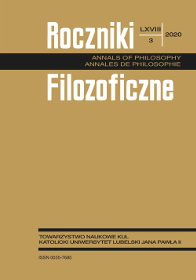Divine Providence: Fine-Grained, Coarse-Grained, or Something in Between?
Abstrakt
Boża opatrzność: szczegółowa, ogólna czy pośrednia?
W swoim eseju Dariusz Łukasiewicz analizuje szczegółowo „argument z przypadku”, zgodnie z którym dane wskazujące na istnienie w świecie przypadku są nie do pogodzenia z Opatrznością Bożą. Łukasiewicz akceptuje pogląd, że owe dane podważają tradycyjny model Opatrzności – model szczegółowy, w którym każdy najmniejszy szczegół jest kontrolowany przez Boga, twierdzi jednak, że nie są one niezgodne z modelem ogólnym, w którym Bóg pozostawia działaniu przypadku wiele aspektów dziejów świata (w tym również przypadki okropnego zła). Łukasiewicz podaje również niezależne racje za przyjęciem tego modelu ogólnego. Chociaż zgadzam się, że dane pochodzące z nauk szczegółowych podważają model maksymalnie szczegółowy, argumentuję, że nie wystarczy to, aby przyjąć model aż tak ogólny, jak Łukasiewiczowy. Proponuję model pośredni, który pozwala uniknąć wad obu modeli skrajnych, a zarazem lepiej współgra z tradycyjnym podejściem do problemu zła.
Bibliografia
Bartholomew, David J. 1984. God of Chance. London: SCM Press.
Bartholomew, David. J. 2008. God, Chance and Purpose: Can God Have It Both Ways? Cambridge: Cambridge University Press. https://doi.org/10.1017/CBO9780511807701.
Collins, Robin. 2009. “The Teleological Argument: An Exploration of the Fine-Tuning of the Universe.” In The Blackwell Companion to Natural Theology, edited by William Lane Craig and J. P. Moreland, 202–281. New York: Wiley.
Flint, Thomas P. 1998. Divine Providence: The Molinist Account. Ithaca, NY: Cornell University Press.
Friederich, Simon. 2018. “Fine-Tuning.” In The Stanford Encyclopedia of Philosophy (Winter 2018), edited by Edward N. Zalta. https://plato.stanford.edu/archives/win2018/entries/fine-tuning/.
Geach, Peter. 1977. Providence and Evil: The Stanton Lectures 1971–2. Cambridge: Cambridge University Press.
Hawthorne, John, and Yoaav Isaacs. 2018. “Fine-Tuning Fine-Tuning.” In Knowledge, Belief, and God: New Insights in Religious Epistemology, edited by Matthew A. Benton, John Hawthorne, and Dani Rabinowitz, 136–68. Oxford: Oxford University Press.
Hodgson, David. 2002. “Quantum Physics, Consciousness, and Free Will.” In The Oxford Handbook of Freewill, edited by Robert Kane. Oxford: Oxford University Press.
Kane, Robert. 1996. The significance of free will. New York: Oxford University Press.
Łukasiewicz, Dariusz. 2014. Opatrzność Boża, wolność, przypadek. Studium z analitycznej filozofii religii. Poznań: W drodze.
Łukasiewicz, Dariusz. 2015. “Argument from Chance.” European Journal for Philosophy of Religion 7 (1): 199–207. https://doi.org/10.24204/ejpr.v7i1.138.
Łukasiewicz, Dariusz. 2017. “Probabilistic Theism and the Problem of Evil.” Analiza i Egzystencja 39: 5–17. https://doi.org/10.18276/aie.2017.39-01.
Łukasiewicz, Dariusz. 2018. “Epistemic Deism and Probabilistic Theism.” European Journal for Philosophy of Religion 10 (1): 129–40. https://doi.org/10.24204/ejpr.v9i4.1872.
McCann, Hugh J. 2012. Creation and the Sovereignty of God. Bloomington: Indiana University Press.
Monod, Jacques. 1970. Le hasard et la nécessité: essai sur la philosophie naturelle de la biologie moderne. Paris: Seuil.
Peels, Rik. 2016. “Can God Repent?” Edited by J. Kvanvig. Oxford Studies in Philosophy of Religion 7: 190–212.
Plantinga, Alvin. 2012. Where the Conflict Really Lies: Science, Religion, and Naturalism. New York: Oxford University Press.
Popper, Karl, and John Eccles. 1977. The Self and Its Brain, An Argument for Interactionism. New York: Springer International.
Van Inwagen, Peter. 1988. “The Place of Chance in a World Sustained by God.” In Divine and Human Action: Essays in the Metaphysics of Theism, edited by Thomas V. Morris, 211–35. Ithaca: Cornell University Press.
Van Inwagen, Peter. 2006. The Problem of Evil. Oxford, New York: Oxford University Press.
Weatherford, Roy. 1982. Philosophical Foundations of Probability Theory. London: Routledge and Kegan Paul.
Copyright (c) 2020 Roczniki Filozoficzne

Utwór dostępny jest na licencji Creative Commons Uznanie autorstwa – Użycie niekomercyjne – Bez utworów zależnych 4.0 Międzynarodowe.





